The landscape of data privacy is evolving rapidly, and by 2025, marketers will face new challenges and opportunities that could make or break their strategies. With sweeping regulatory changes, growing consumer awareness, and increasing reliance on AI and machine learning, the way brands handle personal data will profoundly impact trust, engagement, and revenue.
In this article, we’ll explore the trends, tools, and case studies shaping data privacy in 2025 and offer practical tips and forecasts to help creative professionals and marketing leaders navigate this shifting terrain. Whether you’re in advertising, digital marketing, or branding, understanding how data privacy will reshape your approach is critical.

The Great Privacy Shift: What to Expect in 2025
Consumer Trust and Data Sensitivity
By 2025, consumers will demand far more transparency about how their data is used, and they’ll be more selective about which brands they trust. Data sensitivity will increase as new data privacy regulations are rolled out globally, from updated GDPR frameworks to California Privacy Rights Act (CPRA) revisions.
Key Trends:
- Zero-party data will become essential as consumers actively share their preferences with brands, bypassing the need for third-party cookies.
- Data anonymization and encryption technologies will be crucial for maintaining consumer trust.
- Brands will adopt privacy-first strategies, using secure customer experiences as a competitive edge.
Regulatory Pressure: A Global Privacy Patchwork
The next two years will see a surge in regional privacy laws, forcing global brands to adapt to a patchwork of regulations. Some of these will be inspired by GDPR, while others will have unique requirements. Compliance will become not only a legal obligation but a crucial part of brand positioning.
Notable Regulations on the Horizon:
- ePrivacy Regulation in Europe, tightening rules on electronic communications.
- Federal data privacy laws in the U.S., which could finally emerge in response to a fragmented state-level landscape.
- Asia-Pacific laws: Countries like Japan, South Korea, and Australia will refine their privacy legislation to align more closely with international norms.

The Rise of AI and Machine Learning in Privacy-First Marketing
AI-Driven Privacy Compliance
Artificial intelligence will play a significant role in helping marketers navigate privacy regulations. Tools powered by machine learning will assist in real-time data compliance, flagging potential breaches, and ensuring that marketing campaigns meet the latest legal standards. However, AI will also raise new concerns about data ethics and transparency.
How AI Will Revolutionize Privacy:
- Automated data audits: Real-time analysis of how data is collected, stored, and used will allow brands to stay compliant without human oversight.
- Consent management platforms: These will integrate AI to automatically tailor data consent experiences to individual user preferences.
- AI-driven personalization: With stricter regulations limiting third-party data, marketers will rely on AI to analyze anonymous data for hyper-personalized yet privacy-compliant campaigns.

Practical Tips for Marketers in 2025
Collecting and Managing Zero-Party Data
With cookies on the way out, brands will rely on zero-party data, which is voluntarily shared by users. The challenge is ensuring this data is collected ethically and used to build stronger relationships rather than feeling intrusive.
Best Practices:
- Transparency: Clearly explain to users how their data will be used and the value they will receive in return (e.g., personalized offers, improved experiences).
- Incentivize data sharing: Offer value in exchange for data, such as exclusive content, special deals, or premium access.
- Gamify the experience: Create interactive experiences where users willingly share their preferences, such as quizzes, surveys, or interactive tools.
Leveraging Privacy-Focused Tools
There’s a wealth of privacy-first tools already on the market, and these will continue to evolve by 2025. Marketers will need to stay ahead of the curve to ensure their tech stack is compliant and effective.
Tools to Watch:
- Customer Data Platforms (CDPs): Platforms like Segment and Treasure Data allow brands to centralize first-party data while maintaining privacy.
- Consent Management Platforms (CMPs): Tools like OneTrust and TrustArc help automate consent processes and ensure GDPR and CCPA compliance.
- AI-driven Privacy Analytics: Solutions like BigID and Privitar provide automated data discovery and mapping, helping brands understand where sensitive information resides.

Case Studies: Data Privacy in Action
Apple’s Privacy-First Strategy
Apple has positioned itself as a leader in privacy, embedding the message of “What happens on your iPhone, stays on your iPhone” into its brand identity. The company’s decision to give users control over data-sharing permissions on iOS 14.5 had major implications for advertisers reliant on third-party data.
Results:
- 83% of iOS users opted out of data tracking.
- Brands relying on Facebook Ads saw a significant reduction in the granularity of targeting.
- Apple became a beacon for privacy-first marketing, enhancing customer loyalty by respecting user data.

Unilever’s Commitment to Data Ethics
Unilever launched a People Data Centres initiative, blending ethical data collection with innovative marketing. The brand developed its approach based on transparency, user consent, and a firm commitment to using data to enhance—not exploit—customer relationships.
Key Outcomes:
- Increased brand trust: Unilever saw a 10% rise in consumer trust.
- Enhanced customer engagement: Personalization efforts became more effective as customers willingly shared more data.
- Reduced reliance on third-party cookies, shifting focus toward first-party data strategies.

Forecasting Data Privacy Trends in 2025
The Death of Third-Party Cookies: A New Era
Google’s planned phase-out of third-party cookies has been delayed until 2024, but by 2025, we’ll be in a fully cookie-less world. Marketers will need to rely on first-party data, contextual targeting, and AI-driven insights to maintain personalization and ad performance.
What This Means for Marketers:
- Contextual advertising: Ads will be shown based on the content of the web page rather than user behavior.
- Data partnerships: Brands will collaborate directly with publishers and other companies to share anonymized data pools, ensuring compliance while maintaining insights.
- Privacy-centric personalization: Using AI, marketers will predict user preferences without relying on invasive data collection techniques.
Transparency as a Brand Differentiator
By 2025, transparency in data handling will be a key brand differentiator. Brands that prioritize privacy and make their policies clear and accessible will win consumer trust, while those that falter will face backlash. Expect marketing teams to work closely with legal departments to craft consumer-friendly privacy statements and ongoing communications.

Statistics Supporting This Shift:
- A 2024 Edelman Trust Barometer study revealed that 81% of consumers say they’re more likely to buy from a brand they trust with their data.
- A Cisco 2024 Data Privacy Benchmark Study found that companies investing in privacy saw a 150% return on investment, highlighting the financial benefits of prioritizing data ethics.
Preparing for 2025: Key Takeaways
Actionable Steps for Marketers
- Audit your data practices: Regularly assess how data is collected, stored, and used in your organization.
- Invest in AI: Utilize machine learning to automate compliance, personalization, and consent management.
- Focus on first-party data: Build stronger customer relationships by collecting data directly from your audience.
- Embrace transparency: Make your data practices clear and accessible to build consumer trust.
- Collaborate across teams: Ensure marketing, legal, and IT work together to stay ahead of privacy regulations.
The Road Ahead: Data Privacy and Creativity
Data privacy doesn’t have to stifle creativity. In fact, the limitations on third-party data will force marketers to be more innovative with how they engage audiences. From crafting interactive experiences to relying on ethical data partnerships, 2025 presents an exciting opportunity to rethink how we use data to drive meaningful connections.

Navigating the New Data Privacy Landscape
As we look to 2025, it’s clear that data privacy will no longer be an afterthought in marketing strategies—it will be at the core. For creative professionals, this shift offers the chance to innovate in ways that not only comply with regulations but also foster deeper, more authentic relationships with consumers.
In a privacy-first world, the brands that thrive will be those that embrace transparency, use AI responsibly, and put consumer trust at the center of their marketing efforts. As you prepare for this new era, keep these trends and tools in mind to stay ahead of the curve and turn privacy into a competitive advantage.





